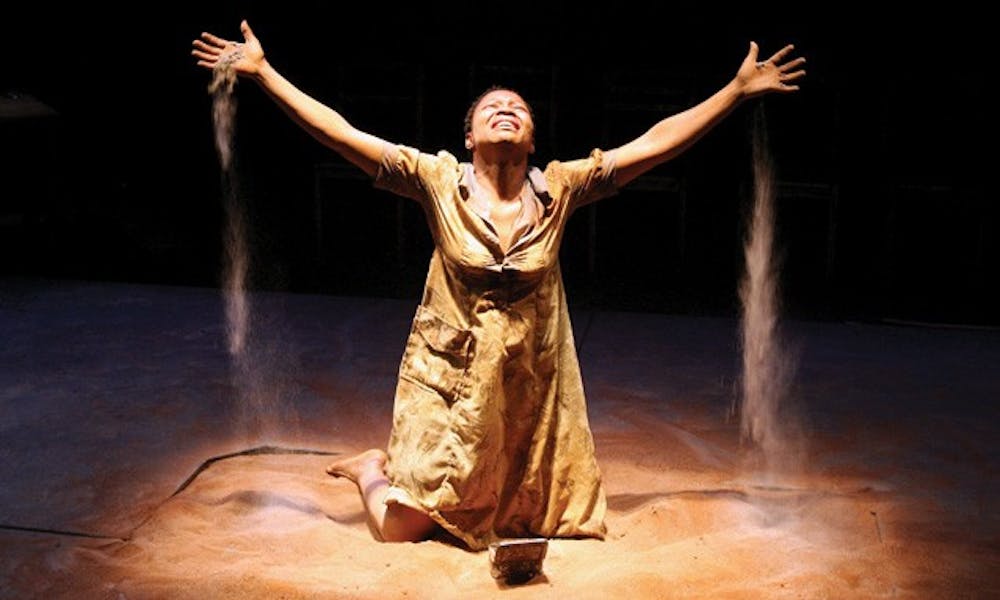Post-apartheid South Africa sets the stage for MoLoRa, a Farber Foundry Theater production presented by Duke Performances. This tale of vengeance and suffering is adapated from an ancient Greek tragedy, Aeschylus’s Oresteia, and updated in the context of the Truth and Reconciliation Commission tribunals, where apartheid victims would face their tormentors.
An unusual feature of the play is the live accompaniment of an exotic musical chorus. The Ngqoko Cultural Group, comprised of one man and six women representing the Xhosa tribe of rural South Africa, plays traditional music that is “very integral” to MoLoRa, said director Yael Farber.
“It’s a very real kind of soundscape they provide and a very grounding emotional quality they bring to the work that really brings the spiritual aspect of the work alive,” Farber said.
The Ngqoko Group’s music is not lyrical in the sense of a conventional musical choir, but rather an incorporation of ancient, traditional instruments and a haunting split-tune vocal technique akin to the guttural elements of throat singing.
“The sound has the weight that choruses brought in ancient Greece,” Farber said. “I often say to the actors that the clue to everything you need to know about what’s moving beneath the words and stories is manifested in the music. It’s almost the heartbeat of the production.”
Oresteia is the surviving section of Aeschylus’s epic trilogy, which chronicles the bloody aftermath of King Agamemnon of Argos’s return from the Trojan War. MoLoRa instead captures the atmosphere of 1990s South Africa, still volatile after years of turmoil. The narrative closely parallels the violent plot of Oresteia, but echoes transcendent themes that audience members of all generations can relate to.
“When we opened in Germany, we had one particular man whose father had been a member of the Gestapo,” Farber said, “and the play brought to life for him the pain of a man whom, for so long, he’d longed to engage in dialogue with and understand better.”
The cast is sparse, focusing on three characters: Dorothy Ann Gould plays Klytemnestra, a white, middle-aged mother of two black children, Elektra (Jabulile Tshabalala) and Orestes (Sandile Matsheni). The three characters engage in macabre quarrels, enumerating each other’s misdeeds in the format of the South African tribunals and ultimately coming to terms with their wrongdoings in a fiery catharsis—molora means “ash” in the Sesotho language.
“There was a particular point in time that I felt I needed to tell stories about the country I come from,” Farber said. “To give joy and art...to give a voice to the silence of what happened over the years and express what the community—certainly what Greek theater—is about.”
The blending of ancient myth, contemporary political relevancy and notions of justice creates what Farber describes as a “powerful metaphor.”
“I took the Oresteia, which is a great examination of the spirals of revenge [and adapted it] to represent, in a microcosm, the system of apartheid,” Farber said.
Farber is an accomplished playwright and director whose company bears her namesake—but though she has orchestrated a variety of accomplished works, MoLoRa holds special relevance given her South African ancestry.
“The theater is a very communal event,” Farber said. “I was interested in better engaging with material [that is] deeply personal.”
Farber Foundry’s residency at Duke represents MoLoRa’s sole American performance this year, after runs in Greece, Johannesburg and the Barbican in London.
“It’s really spectacular—it’s a brilliant piece of theater and it’s never run in the American South,” said Aaron Greenwald, Director of Duke Performances. “We’re really incredibly fortunate to have this remarkable piece of theater here.”
Beyond the double showing of MoLoRa this Friday and Saturday, Farber Foundry has presented a variety of lectures free and open to the public this week. Tomorrow afternoon, Farber and University of California Berkeley professor Catherine Cole will host a LunchBox Conversation in Bryan Rehearsal Studio.
MoLoRa will be performed in Reynolds Industries Theater Friday and Saturday at 8 p.m. Tickets are $5 for students and $22-28 for general admission.
Get The Chronicle straight to your inbox
Signup for our weekly newsletter. Cancel at any time.

